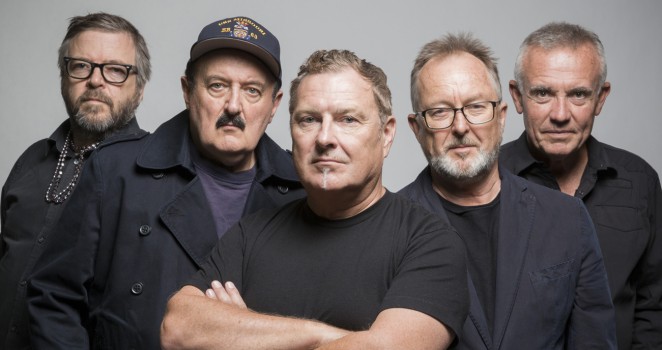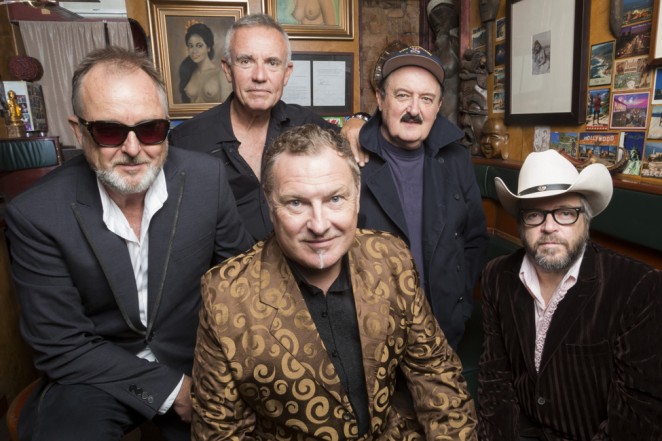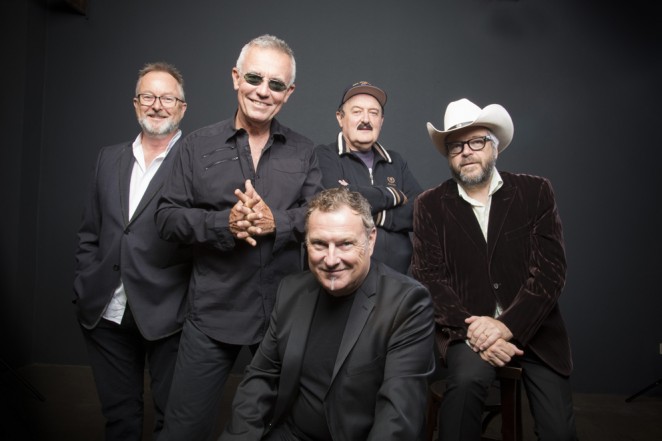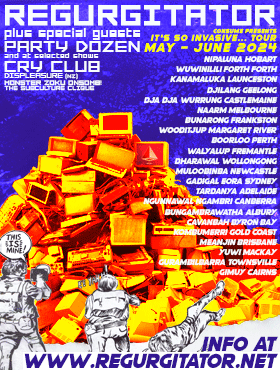
Mondo Rock reserve an eternal place in Australian rock music history. Buoyed by a successful reformation tour last year, the band is back to do a select season of theatre shows throughout August. Greg Phillips spoke to guitarist Eric McCusker about the band’s career and sound.
“I think we put out about 18 singles and ten of them went top 40, so we can do a whole hour and twenty minutes and every second song will be a hit,” says Mondo Rock guitarist Eric McCusker speaking about the set list of the band’s upcoming August theatre tour. It was actually much more than 18 singes released, including a few before Eric had joined Mondo Rock, a band he used to see when he moved to Melbourne from Sydney. “I moved to Melbourne at the beginning of ’79, into a house with my good friend Wilbur Wilde,” recalls Eric. “We used to go and see the first version of Mondo Rock a few times and that’s when I met Ross Wilson, perhaps at Bombay Rock.”
Mondo Rock exemplified 80s pop/rock with their slick hits and cheesy videos. Ross Wilson had learned much from the success of Daddy Cool and his experimentation with bands such as Sons of the Vegetal Mother and Mighty Kong. He further refined his studio knowledge, producing hits for other bands such as Skyhooks and Jo Jo Zep, then combined all of that music professionalism into the modern bop of Mondo Rock. More than anything though, Mondo Rock worked hard at being a successful band. “We were a hard working band,” Eric tells me. “There was a real powerful work ethic in that band. We used to rehearse a lot and record a lot of demos. It was good having two songwriters in the band. I think that was the main reason Ross got me in, apart from the fact that I was a competent guitar player, was the fact that I was able to write a lot of songs. The funny thing was, half way into my first year of Mondo Rock in 1980, I’d signed with a publishing company, Warner Chappell. They said can you write some songs that we can sell to other people? So I wrote a bunch of demos and one of the songs was ‘State of the Heart’. I didn’t think Mondo Rock would be interested in a ballad, we were playing fairly full on rockier stuff. Then I played the band the demos and they were like … what’s the matter? You keeping your best songs for other people?”
Mondo Rock did record the song and so successful was State of the Heart, that it remained in the charts for six months. Although written by McCusker, a guitarist, the perfect place for a guitar solo in the song was replaced instead by a bass groove. “The solo was a really interesting thought,” explains Eric. “The solo is pretty much a restating of the melody of the verses with a bit extra. Then Ross did the falsetto singing over the top of it. So the concept of not having a middle where it gets big and fills up, it sort of emptied out and took the emphasis to the bottom end with the bass playing. I thought it was a really interesting thing and then Rick Springfield recorded that song and got completely rid of that and wrote a vocal bridge for it … it was like … coward,” laughs McCusker. “Made me some money though so that was good!”
 The 80s was the era of the video with Molly Meldrum’s Countdown and later MTV, having a huge influence on what did or didn’t chart. Video was an aspect of the business that Eric enjoyed. He grew up doing a live to air television science show in the 60s in Sydney with his physicist dad, so he knew a thing or two about TV and enjoyed the medium. “I was into TV,” says Eric. “I think I even directed one of the Mondo Rock film clips. It was a disastrous one that never got seen. It was called The Moment and we ended up using some live footage for it. Actually, I was just talking to the director who did the ‘Cool World’ clip where I go backwards into the swimming pool with a guitar. That was a cheap guitar by the way. I mean, I think it was probably a Teisco or something which is starting to become collectable now. We’d shot that all night at The Townhouse in Carlton. You can see in one shot, I think it’s where James Black’s hands are playing the synthesiser, that it is already getting light after shooting all night. He said we had to shoot a lot of it again because the film was in backwards or something.”
The 80s was the era of the video with Molly Meldrum’s Countdown and later MTV, having a huge influence on what did or didn’t chart. Video was an aspect of the business that Eric enjoyed. He grew up doing a live to air television science show in the 60s in Sydney with his physicist dad, so he knew a thing or two about TV and enjoyed the medium. “I was into TV,” says Eric. “I think I even directed one of the Mondo Rock film clips. It was a disastrous one that never got seen. It was called The Moment and we ended up using some live footage for it. Actually, I was just talking to the director who did the ‘Cool World’ clip where I go backwards into the swimming pool with a guitar. That was a cheap guitar by the way. I mean, I think it was probably a Teisco or something which is starting to become collectable now. We’d shot that all night at The Townhouse in Carlton. You can see in one shot, I think it’s where James Black’s hands are playing the synthesiser, that it is already getting light after shooting all night. He said we had to shoot a lot of it again because the film was in backwards or something.”
Another factor which defined 80s music was the proliferation of synthesisers. Roland’s Jupiter 8 was prominent on the big ones such as Michael Jackson’s ‘Thriller’ and Tears For Fears’ “Songs From The Big Chair’. The Fairlight made a name for itself on albums by Stevie Wonder, Thomas Dolby, ABC and Yes, and the Yamaha DX7 was just on everything. The science-loving McCusker was also into sounds of the 80s.
“I enjoyed synthesis,” says Eric. “Before samples there were synthesisers where you would have to actually make the sound from the ground up. James Black, our keyboard player is an absolute genius at that. In his work in Mondo Rock in the first part of the 80s, he was generating all of those sounds mainly on Prophet 5, a great synthesiser. When we do gigs now it is so amazing to have all of those sounds available, it’s like being inside the records. He used Vocoder a lot which people don’t really notice that much but on songs like Come Said The Boy and No Time, he uses Vocoder. It’s a real fat sound. I notice when I play with other people, whenever I do the solo in Come Said The Boy with other bands, there is always a big fall away behind in terms of the strength and fatness of the keyboard sounds.”
For the last couple of decades Eric McCusker’s main guitar has been a ’68 Stratocaster but like many long-serving guitarists, he’s had many. “When I started out in Mondo Rock, I was kinda broke! I did have a mid 60s Telecaster and the other good guitar which I had was a Gibson ES335, a ’59 I think,” he recalls. “I played that when I was in the Jon English band but I had to sell that to move to Melbourne. I started out playing Ibanez Roadstars. Then I got a ’61 Les Paul Jnr and played that for a long time until it got stolen. Strangely enough I think I have got it back now 30 years later. I am pretty sure it is the same one or one extremely like it. On Come Said The Boy, I played on a ’69 Strat that I bought in New York, which I don’t have now. My main guitar now and has been for the last 17 years is a ’68 Strat with L series pick ups, a bridge and tremolo unit like an early ’68, looks like a ’67, ’66. It’s a cracker of a guitar and I play almost always on one pickup, the middle pickup. I have basically played a thousand gigs on one pickup. It’s just one of those guitars that I trust my life to it. But I do have a lot of other guitars that I play. I’m back playing a bit of Telecaster at the moment. I have a fantastic Greco, Les Paul Sunburst. I have a crazy Takamine Explorer copy. Someone asked me what my ambition was and I think I said as a teenager, to own a Strat and now I have a few. I had a ’58 for a while but had to sell it to pay a tax bill. I love my gear.”
And what was in Eric’s pedalboard back in the day compared to now?
“I had one of those Ibanez combination mulit-effects units, which are now starting to become rather collectable again. The second half of the 80s, I was running this whole stereo system with 200 watt Marshalls. In the first half I bought a 100 watt Marshall Super Lead in 1980, which is what I used most of the time. I had a an original brand Chorus pedal. Then when I got a bit more sophisticated, I used 200 watt Marshalls which was a bit excessive, using a Dimension D to provide the stereo-isation, a whole custom-made set up. I also had a Boss distortion thing that controlled the distortion with the pedal, which was a great device. You could use it just when you wanted a note to go into full feedback sustain, you could just do it on the end of the note. It had incredible control. My main overdrive I have been using for a long time is the Hotcake, a NZ made thing made by Paul Crowther. I have about 4 of those. I actually have got a stereo system again for Mondo Rock but a lot more compact. It’s on a pedal train so not a very big board. So I’m using a Hotcake, an old Tube Screamer, a Boss Digital Dimension, a Line 6 delay and a very good routing pedal called a Lehle, a German thing and that sends all things. You can you go into stereo in and out, and lift earth and swap phase. When I used to use stereo set ups of amps, I spent hours trying to get rid of earth loops but with this pedal, you press one button and get rid of it.”
“We don’t use in-ear monitors with Mondo Rock,” says Eric as he continues to discuss the band’s current stage set up. “I still like to feel my trouser leg flapping and hearing the sound of the guitar amp. I’ve got quite scientific about monitors. We have a whole system of EQing monitors. I use the guitar tuner on my phone, so I can hear a note and I’ll just be able to sing it and note if it is resonating too loud in the EQ of the foldback. I’ll sing that note and be able to say to the foldback guy, yep 330 hertz, pull it out a little bit. So we are pretty scientific and systematic about foldback. People go, what are you doing? What are those numbers? My dad was a physicist so I am reasonably fond of physics and sound. It means you can solve a problem in a minute. It takes me about a minute to EQ my foldback if I have somebody half decent on the desk, which we usually do.”
 Mondo Rock is now in the fortunate position of having the rights to all of their material returned to them. Both Ross and Eric own their publishing and also own the masters to the hit album Chemistry and all of the subsequent Mondo Rock albums. The plan is to release a definitive best of Mondo Rock album and the upcoming August ‘Best O’Mondo’ tour is the precursor to this. The reclaiming of the band’s rights was quite serendipitous. “The Chemistry album ended up being on-sold to somebody and this guy who is the CEO of Lend Lease in South East Asia had bought this catalogue,” explains Eric. “He’d bought it off Elle McPherson’s brother or someone, crazy story and anyway, it included the rights to the Chemistry album. He got in contact with us, he’s a heritage kind of guy, similar age to us and he said what do you want to do about this record? We said we’d love to get it back. He said how about I give it back to you and you come and play at my 50th birthday? We went … OK! Then he moved to Singapore and we didn’t end up doing that but we reminded him about our unfulfilled commitment and he said come up to Singapore and do it. So we ended up going to Singapore and doing an Anzac day gig and we also got to back Angry Anderson for three songs which was good combo. Who would have thought Mondo Rock and Angry Anderson would team up but it was great. So now we have the rights back to the Chemistry album.”
Mondo Rock is now in the fortunate position of having the rights to all of their material returned to them. Both Ross and Eric own their publishing and also own the masters to the hit album Chemistry and all of the subsequent Mondo Rock albums. The plan is to release a definitive best of Mondo Rock album and the upcoming August ‘Best O’Mondo’ tour is the precursor to this. The reclaiming of the band’s rights was quite serendipitous. “The Chemistry album ended up being on-sold to somebody and this guy who is the CEO of Lend Lease in South East Asia had bought this catalogue,” explains Eric. “He’d bought it off Elle McPherson’s brother or someone, crazy story and anyway, it included the rights to the Chemistry album. He got in contact with us, he’s a heritage kind of guy, similar age to us and he said what do you want to do about this record? We said we’d love to get it back. He said how about I give it back to you and you come and play at my 50th birthday? We went … OK! Then he moved to Singapore and we didn’t end up doing that but we reminded him about our unfulfilled commitment and he said come up to Singapore and do it. So we ended up going to Singapore and doing an Anzac day gig and we also got to back Angry Anderson for three songs which was good combo. Who would have thought Mondo Rock and Angry Anderson would team up but it was great. So now we have the rights back to the Chemistry album.”
Apart from the odd Mondo Rock gig, Eric has always kept his rock ‘n’ roll chops up. He currently plays in a funk band called Jam The Funk with Danny Simcic from Real Life and vocalist Nikki Nicholls and is also rehearsing a new band featuring Joe Creighton and Alex Formosa. His passion for the last few years however, has been a musical he wrote called Ava At The End of the World, based on American actress Ava Gardner’s visit to Australia in 1959. Foremost in Eric’s mind though, is the Mondo Rock tour in which you’ll hear all of the Mondo Rock hits including Come Said The Boy, State of the Heart, Cool World, Summer of ’81, Chemistry and many more. The tour kicks off in Brisbane at QPAC on August 1, followed by Sydney on August 21 at the State Theatre and then at Melbourne’s Palais on August 22. As a bonus, you’ll be able to catch fellow 80s hitmakers Mi-Sex as the support act.
For full tour information, please visit:
www.zaccariaconcerts.com.au or the band’s website www.mondorock.net

